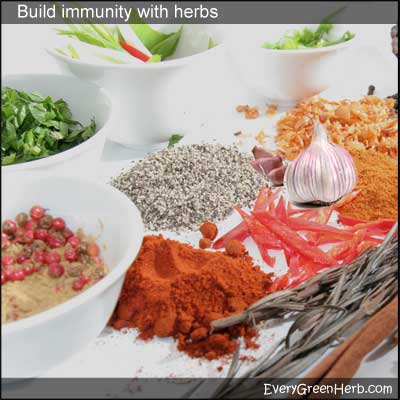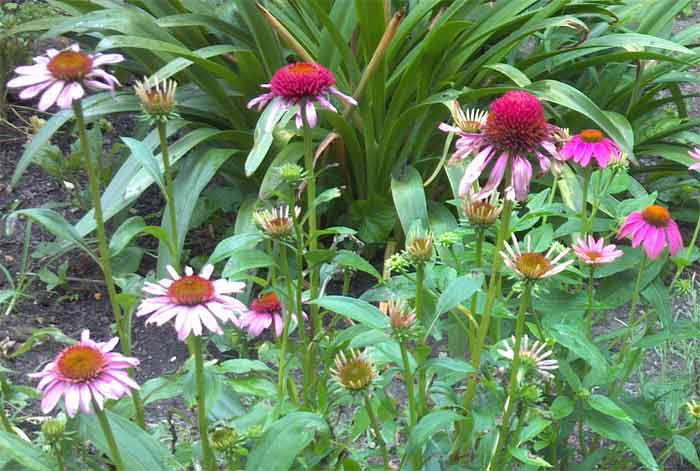Immunity herbs

When the body is strong and healthy, disease doesn't stand a chance. The body's white blood cells, part of our amazing immune system, work quickly to destroy harmful toxins and invading germs.
Good diet, exercise, and healthy lifestyle choices keep both our bodies and our immune systems working properly, but sometimes we need help. When life gets messy, whether experiencing extreme stress that leads to inflammation or suffering from an unexpected injury, our immunity can become overwhelmed.
When our white blood cells and other parts of the immune system are too busy fighting inflammation or other traumas, they might ignore invaders like cold and flu germs. This is when illness takes hold and we get sick.
What we really mean when we say "building immunity" is keeping our immune systems nourished, ready to fight virus, bacteria, and other pathogens. There are many ways to boost immunity including medicinal herbs.
The right herbs can really give our defenses a boost.
Top five herbs for the immune system:
I pick astragalus, echinacea, garlic, ginseng, and licorice for this list because they are readily available and they work. All five of these immunity herbs are time-tested and proven to build the immune system.

Tony and I rotate astragalus and echinacea, taking several doses daily either in capsule, tea, or tincture form. We take astragalus for two weeks, then switch to echinacea for two weeks starting in mid-September through the winter.
We stop in late March, switching to spring tonics like dandelion, cleavers, and chickweed.
A strong immune system protects against infection and disease. The immune system, just like the rest of the body, is improved with herbs, healthy diet, clean water, fresh air, plenty of exercise, and a healthy lifestyle.
Fresh herbs for immunity
Tony chops fresh garlic and puts it on top of green beans. I eat garlic raw, use the dried tops in sauces, and add it to lots of the foods I cook.
We use ginseng and licorice occasionally as needed when energy levels are low or we are feeling an unusual amount of stress. Both ginseng and licorice are potent remedies and we use those as needed but are careful not to overdo. Too much of a good thing is not always best.
This schedule for taking herbs to build our immunity works for us. Of course, everyone is different so keep trying appropriate herbs until you find the perfect herbal blends for your body.
Why is immunity important?
The immune system protects us from sickness and disease. Many parts of the body make up the immune system including the thymus, spleen, lymph glands, tonsils, adenoids, enzymes, proteins, and bone marrow.
White blood cells and lymphocytes, constantly searching for harmful antigens, make up the backbone of immune defenses. These little security guards are constantly dealing with viruses, funguses, bacteria, parasites, pollen, insect venoms, chemicals, malignant cells, and foreign intruders.
Building immunity with a healthy lifestyle
A healthy immune system depends on good diet, quality herbs, exercise, fresh air, clean drinking water, and getting eight hours of sleep every night.
If your body is constantly fighting the effects of pollution, unhealthy food, dehydration, and lack of sleep, your immune system will have a hard time doing its job.
All the herbal remedies in the world can't overcome an unhealthy lifestyle.

How do I know if my immunity is low?
Symptoms of poor immunity include chronic infection, inflammation, frequent colds, respiratory problems, swollen lymph glands, exhaustion, chronic fatigue, food allergies, insomnia, and depression.
When the immune system is working at peak performance, the body fights off disease causing germs. Good diet low in processed sugars, restful sleep, and exercise are the main requirements for keeping the immunity in good shape.
Breathing fresh clean air, getting morning sunlight, and maintaining low stress levels are also important.
To improve immunity, avoid toxins.
Toxic substances can wreck havoc with the immune system. To boost the immunity, avoid junk food (saturated fats and sugars), tobacco, pesticides, herbicides, recreational drugs, antibiotics, smoke, traffic fumes, and steroids.
Many prescription and over-the-counter drugs can contribute to a decline in immunity. They should be taken with caution and only when necessary.
Avoiding stress helps build immunity.
“Take time to smell the roses” is a great old saying that holds as true today as it did in past ages. Memorable fragrances like apple pie or freshly mowed grass, combined with relaxation techniques like deep breathing can greatly reduce stress and boost immunity.
So can smelling lavender, rosemary, and other fragrant herbs. Aromatherapy is a great way to reduce stress.
Scheduling time in for relaxation, meditation, and prayer works wonders for the immune system. It is also a good idea to develop good relationships with other people. Loneliness lowers immunity.
Build immunity with aromatherapy.
Aromatherapy is a great way to build up immunity. Use favorite essential oils in massage, bath, and diffusers.
Most all essential oils help kill bacteria and stimulate production of white blood cells. It has been found that people who use essential oils have a much higher level of resistance to illness. They catch fewer colds and recover more quickly.
Myrrh essential oil is a good one to try. Remember that essential oils are powerful. One drop goes a long way.
If you have been reading my Every Green Herb blog for a while, then you know we grow and sell a variety of herbs, but we also buy a lot, too. Try our favorite herbal suppliers for quality and value.
Laughter helps build up the immune system.
“Laughter is the best medicine” especially holds true in cases of a depressed immunity. Find reasons to laugh. See a funny movie, get together with friends, or read a light-hearted book.
Studies show that laughter actually does decrease harmful chemicals that suppress the immune system.
Boost immunity with herbal green drinks.
In cases of depressed immunity, take high potency green super foods daily.The active ingredients and live enzymes in “green drinks” can detoxify the blood.
Whole grains and fresh vegetables should be consumed at every meal. Also add fruits, seeds, nuts, cold-pressed oils, and lean meat to your diet.
Build immunity with a variety of herbs.
Many herbs can build immunity. Besides astragalus, echinacea, garlic, ginseng, and licorice, there are others that can really help.
Mushrooms, goldenseal, yellowroot, rosemary, burdock, milk thistle seed, white willow, elder flowers, catnip, yarrow, boneset, hawthorn, parsley, oregano, cat's claw, Pau d Arco, and dandelion work to improve the immune system.
A good tincture recipe for building immunity
An excellent tincture for building immunity might include echinacea root, ginseng root, cinnamon bark, cat's claw bark, and Pau d Arco inner bark. Add Usnea lichen for extra benefits.
- Cover the pieces of herbal plant material with vodka.
- Gently shake daily and make sure plant material stays under the vodka.
- Keep in a dark, cool place for two weeks then strain.
- Keep liquid in air tight container in dark pantry or your refrigerator.
- Take a teaspoon every six hours for a few days after you have been exposed to germs.
Build immunity with mullein and cleavers.
Some herbs improve immunity by strengthening the lymphatic system. Red clover, mullein, cleavers, barberry, and baptisia (wild indigo) are the most useful. The lymphatic system also depends on exercise since it doesn't have a pump like the blood vessels and heart.
Build immunity before flu season.
For added protection during the cold and flu season, start taking immunity-building herbal teas and tinctures on a daily basis in late August. Try taking echinacea for a couple of weeks, then switch to astragalus or a yellowroot / ginseng mixture.

The lymphatic system and immunity
It is important to keep things moving. When the lymphatic system becomes congested from lack of exercise, the body suffers.
If you are in a situation where exercise is difficult, try drinking cleaver tea. Herbal teas can help get rid of toxins and boost immunity when broken bones and knee replacements keep us down.
You can also use angelica infused oils in gentle massage, concentrating on areas with lots of lymph nodes like behind the knees and lower abdomen. Angelica works to improve immunity by keeping the lymphatic system healthy.
Science, herbs, and immunity
Studies show that the immune system is damaged by stressful situations such as financial insecurity, social distancing, and fear of food scarcity. Stress weakens the immunity and slows the body's healing processes, but herbs can help.
The World Health Organization advises people to eat fresh food on a daily basis including green plants. They also say to avoid excess sugar, fat, and sodium.
Green plants and herbs provide antioxidants, polyphenols, and other compounds that provide nutrients that the body needs to stay healthy.
Although herbs have been used for thousands of years to treat diseases, they are just now undergoing clinical research trials. Herbs are not only healing, they are not fattening, they don't contain a lot of sodium, and they don't contain cholesterol.
Heathcare professionals say that the general public has a growing interest in the use of herbs for health. Studies are underway to find the herbs best suited to improve immunity.
Plants that reduce the effects of the cytokine cascades of inflammation in the body are of special interest. Cinnamon, ginger, cloves, turmeric, cumin, chili pepper, paprika, black pepper, garlic, onions, basil, rosemary, sage, thyme, oregano, coriander, spearmint, peppermint, and fenugreek look promising.
Not only do these herbs build immunity, they fight high blood pressure, bad cholesterol levels, and pain!
*For best results, avoid excessive or prolonged use of any herb. People with high blood pressure, obesity, diabetes, kidney, heart, or liver conditions should avoid licorice. This herb should not be used by pregnant or breast-feeding women or by men with sexual dysfunctions. Licorice contains glycyrrhizin which can cause serious side effects.
Do not use ginseng with caffeine. People with high blood pressure should not use ginseng. Do not use ginseng during pregnancy.
Do not use therapeutic amounts of garlic with blood thinners or before having surgery. Don't take garlic if you're on hypoglycemic drugs. Avoid while nursing as garlic may cause the baby to have indigestion. Garlic can irritate the stomach and skin in sensitive individuals. Test before using large amounts! Avoid high doses of garlic in pregnancy and while nursing.
High doses of echinacea can cause nausea and dizziness. Consult with a physician before taking echinacea if you have an autoimmune disease such as TB, lupus, collagen disease, or multiple sclerosis. Sometimes people that are allergic to daisies, mums, asters, or ragweed may experience a reaction to echinacea.
Never take astragalus root when feverish as it may raise body temperature. Astragalus plants produce a gummy sap that may cause rash or bring on asthma attacks in some individuals.
Always consult with a healthcare professional before using any herbal remedy especially if pregnant, nursing, or taking other medications.
Sources:
https://www.ncbi.nlm.nih.gov/pmc/articles/PMC7815254/
Blessings to you and yours!
Thanks so much for reading my blog. Jan.

*Note - the information on this website has not been evaluated by the Food and Drug Administration.
© 2005-2024 website design and content by Janice Boling